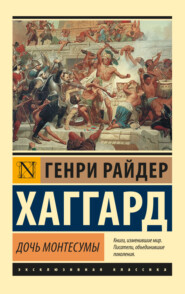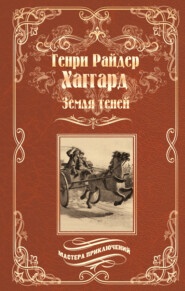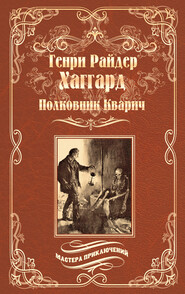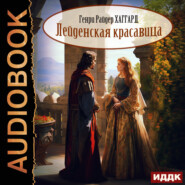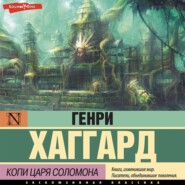По всем вопросам обращайтесь на: info@litportal.ru
(©) 2003-2024.
✖
Allan and the Ice-Gods
Автор
Серия
Год написания книги
1927
Настройки чтения
Размер шрифта
Высота строк
Поля
“I believe I am addressing Mr. Allan Quatermain.”
I bowed and he went on:
“I come upon a strange errand, Mr. Quatermain, so strange that I doubt whether, in the course of your life, which as I have heard has been full of adventure, you have ever known its equal. You were, I believe, well acquainted with our late client, Lord Ragnall, also with his wife, Lady Ragnall, formerly the Hon. Luna Holmes, of whose recent sad death you may per haps have heard.”
I said that this was so, and the lawyer went on in his dry precise way, watching my face as he spoke:
“It would appear, Mr. Quatermain, that Lady Ragnall must have been much attached to you, since, a while ago, after a vis it that you paid to her at Ragnall Castle, she came to our office and made a will, a thing I may add that we had never been able to persuade her to do. Under that will – as you will see presently, for I have brought a copy with me – she left everything she possessed, that is, all the great Ragnall property and accumulated personality of which she had the power to dispose at her unfettered discretion, to – ahem – to you.”
“Great heavens!” I exclaimed, and sank back into a chair.
“As I do not sail under false colours,” went on Mr. Mellis with a dry smile, “I may as well tell you at once that both I and my partner protested vehemently against the execution of such a will, for reasons that seemed good to us but which I need not set out. She remained firm as a rock.
“’You think I am mad,’ she said. ’Foreseeing this, I have taken the precaution of visiting two eminent London specialists to whom I told all my history, including that of the mental obscuration from which I suffered for a while as the result of shock. Each of these examined me carefully and subjected me to tests with the result – but here are their certificates and you can judge for yourselves.’
“I, or rather we, read the certificates, which, of course, we have preserved. To be brief, they stated that her ladyship was of absolutely sound and normal mind, although certain of her theories might be thought unusual, but not more so than those of thousands of others, some of them eminent in various walks of life. In face of these documents, which were entirely endorsed by our own observation, there was but one thing to do, namely, to prepare the will in accordance with our client’s clear and definite instructions. While we were writing these down, she said suddenly:
“’Something has occurred to me. I shall never change my mind, nor shall I remarry, but, from my knowledge of Mr. Quatermain, I think it possible and even probable that he will refuse this great inheritance’ – a statement, sir, which struck us as so incredible that we made no comment.
“’In that event,’ she continued, ’I wish all the real property to be realized and together with the personality, except certain legacies, to be divided among the societies, institutions, and charities that are written down upon this list,’ and she handed us a document, ’unless indeed Mr. Quatermain, whom, should he survive me, I leave my sole executor, should disapprove of any of them.’
“Do you now understand the situation, sir?”
“Quite,” I answered. “That is, no doubt I shall when I have read the will. Meanwhile, I suggest that you must be hungry after your journey and that we should have lunch.”
So we lunched, talking of indifferent matters while the servants were in the room, and afterward returned to my study, where the documents were read and expounded to me by Mr. Mellis. To cut the story short, it seemed that my inheritance was enormous; I am afraid to state from memory at what figure it was provisionally valued. Subject to certain reservations, such as an injection that no part of the total, either in land or in money, was to be alienated in favour of Mr. Atterby-Smith, a relative of Lord Ragnall whom the testatrix held in great dislike, or any member of his family, and that, for part of the year, I must inhabit Ragnall Castle, which might not be sold during my lifetime, or even let. All this vast fortune was left at my absolute disposal, both during my life and after my death. Failure to observe these trusts might, it seemed, invalidate the will. In the event of my renouncing the inheritance, however, Ragnall Castle, with a suitable endowment, was to become a county hospital, and the rest of the estate was to be divided in accordance with the list that I have mentioned – a very admirable list, but one which excluded any society or institution of a sectarian nature.
“Now I think that I have explained everything,” said Mr. Mellis at length, “except a minor and rather peculiar provision as to your acceptance of certain relics, particularly described by the testatrix in a sealed letter which I will hand to you presently. So it only remains for me, Mr. Quatermain, to ask you to sign a document which I have already prepared and brought with me, to enable me to deal with these great matters on your behalf. That is,” he added with a bow, “should you propose to continue that confidence in our firm with which the family of the late Lord Ragnall has honoured it for several generations.”
While he was hunting in his bag for this paper, explaining, as he did so, that I must be prepared to face an action brought by Mr. Atterby-Smith, who had been raging round his office “like a wild animal,” suddenly I made up my mind.
“Don’t bother about that paper, Mr. Mellis,” I said, “because Lady Ragnall was right in her supposition. I have no intention of accepting this inheritance. The estate must go for division to the charities, etcetera, set down in her list.”
The lawyer heard, and stared at me.
“In my life,” he gasped at last, “I have known mad testators and mad heirs, but never before have I come across a case where both the testator and the heir were mad. Perhaps, sir, you will be pleased to explain.”
“With pleasure,” I said when I had finished lighting my pipe. “In the first place, I am already what is called a rich man and I do not want to be bothered with more money and property.”
“But, Mr. Quatermain,” he interrupted, “you have a son who, with such wealth behind him, might rise to anything – yes, anything.” (This was true, for, at that time, my boy Harry was living.)
“Yes, but, as it chances, Mr. Mellis, I have ideas upon this matter which you may think peculiar. I do not wish my son to begin life with enormous resources, or even the prospect of them. I wish him to fight his own way in the world. He is going to be a doctor. When he has succeeded in his profession and learned what it means to earn one’s own bread, it will be time for him to come into other people’s money. Already I have explained this to him with reference to my own, and being a sensible youth, he agrees with me.”
“I daresay,” groaned the lawyer. “Such – well, failings – as yours, are often hereditary.”
“Another thing is,” I went on, “that I do not wish to be bothered by a lawsuit with Mr. Atterby-Smith. Further, I cannot bind myself to live half the year in Ragnall Castle in a kind of ducal state. Very likely, before all is done, I might want to return to Africa, which then I could not do. In short, it comes to this: I accept the executorship and my out-of-pocket expenses, and shall ask your firm to act for me in the matter. The fortune I positively and finally refuse, as you observe Lady Ragnall thought it probable I should do.”
Mr. Mellis rose and looked at the clock. “If you will allow me to order the dogcart,” he said, “I think there is just time for me to catch the afternoon train up to town. Meanwhile, I propose to leave you a copy of the will and of the other documents to study at your leisure, including the sealed letter which you have not yet read. Perhaps after taking independent advice, from your own solicitors and friends, you will write me your views in a few days’ time. Until then, this conversation of ours goes for nothing. I consider it entirely preliminary and without prejudice.”
The dogcart came round – indeed, it was already waiting – and thus this remarkable interview ended. From the door step I watched the departure of Mr. Mellis and saw him turn, look at me, and shake his head solemnly. Evidently he thought that the right place for me was a lunatic asylum.
“Thank goodness, that’s done with!” I said to myself. “Now I’ll order a trap and go and tell Curtis and Good about all the business. No, I won’t; they’ll only think me mad as that lawyer does, and argue with me. I’ll take a walk and mark those oaks that have to come down next spring. But first I had better put away these papers.”
Thus I reflected and began to collect the documents. Lifting the copy of the will, I saw lying beneath it the sealed letter of which Mr. Mellis had spoken, addressed to me and marked To be delivered after my death, or in the event of Mr. Quatermain pre-deceasing me, to be burned unread.
The sight of that well-known writing and the thought that she who penned it was now departed from the world and that nevermore would my eyes behold her, moved me. I laid the letter down, then took it up again, broke the seal, seated myself, and read as follows:
My dear friend, my dearest friend, for so I may call you, knowing as I do that if ever you see these words we shall no longer be fellow citizens of the world. They are true words, be cause between you and me there is a closer tie than you imagine, at any rate, at present. You thought our Egyptian vision to be a dream – no more; I believe it, on the other hand, at least in essentials, to be a record of facts that have happened in by gone ages. Moreover, I will tell you now that my revelation went further than your own. Shabaka and Amada were married and I saw them as man and wife leading a host southward to found a new empire somewhere in Central Africa, of which per chance the Kendah tribe were the last remnant. Then the darkness fell.
Moreover, I am certain that this was not the first time that we had been associated upon the earth, as I am almost certain that it will not be the last. This mystery I cannot understand or explain, yet it is so. In some of our manifold existences we have been bound together by the bonds of destiny, as in some we may have been bound to others, and so, I suppose, it will continue to happen, perhaps for ever and ever.
Now, as I know that you hate long letters, I will tell you why I write. I am going to make a will, leaving you practically everything I possess – which is a great deal. As there is no relationship or other tie between us, this may seem a strange thing to do, but after all, why not? I am alone in the world, without a relative of any kind. Nor had my late husband any except some distant cousins, those Atterby-Smiths whom you may remember, and these he detested even more than I do, which is saying much. On one point I am determined – that they shall never inherit, and that is why I make this will in such a hurry, having just received a warning that my own life may not be much prolonged.
Now, I do not deceive myself. I know you to be no money-hunter and I think it highly probable that you will shrink from the responsibilities of this fortune which, if it came to you, you would feel it your duty to administer it for the good of many to the weariness of your own flesh and spirit. Nor would you like the gossip in which it would involve you, or the worry of the actions-at-law which the Atterby-Smiths, and perhaps others unknown, would certainly bring against you. Therefore, it seems possible that you will refuse my gift, a contingency for which I have provided by alternative depositions. If a widowed lady without connections chooses to dispose of her goods in charity or for the advancement of science, etc., no one can complain. But even in this event I warn you that you will not al together escape, since I am making you my soul executor, and although I have jotted down a list of the institutions which I propose to benefit, you will be given an absolute discretion concerning them with power to vary the amounts, and add to, or lessen, their number. In return for this trouble, should you yourself renounce the inheritance, I am leaving you an executor’s fee of 5,000 pounds, which I beg that you will not renounce, as the mere thought of your doing so offends me. Also, as a personal gift, I ask you to accept all that famous set of Caroline silver which was used on grand occasions at Ragnall, that I remember you admired so much, and any other objects of art that you may choose.
Lastly – and this is the really important thing – together with the Egyptian collection, I pass on to you the chest of Taduki herb with the Kendah brazier, etc., enjoining you most strictly, if ever you held me in any friendship, to take it, and above all to keep it sacred.
In this, Friend, you will not fail me. Observe, I do not direct you to make further experiments with the Taduki. To begin with, it is unnecessary, since, although you have recently refused to do so in my company – perhaps because you were afraid of complications – sooner or later you will certainly breathe it by yourself, knowing that it would please me much, and, perhaps, when I am dead, hoping that through it you may see more of me than you did when I was alive. You know the dead often increase in value at compound interest, and I am vain enough to hope that this may be so in my case.
I have no more to say. Farewell – for a little while.
Luna Ragnall.
P.S. You can burn this letter if you like; it does not in the least matter, as you will never forget its contents. How interesting it will be to talk it over with you one day.
Chapter 2
Back to the Past
It is unnecessary that I should set out the history of the disposal of the great Ragnall fortune in any detail. I adhered to my decision which at last was recorded with much formality; though, as I was a totally unknown individual, few took any interest in the matter. Those who came to hear of it for the most part set me down as mad; indeed, I could see that even my friends and neighbours, Sir Henry Curtis and Captain Good, with whom I declined to discuss the business, more or less shared this view, while a society journal of the lower sort printed a paragraph headed:
THE HUNTER HERMIT. IVORY TRADER WHO MOCKED AT MILLIONS!
Then followed a distorted version of the facts. Also I received anonymous letters written, I do not doubt, by members of the Atterby-Smith family, which set down my self-denial to “the workings of a guilty conscience” and “to fears of exposure.”
Of all these things I took no heed, and notwithstanding wild threats of action by Mr. Atterby-Smith, in due course the alternative clauses of the will came into operation, under which, with only a rough list to guide me, I found myself the practical dispenser of vast sums. Then indeed I “endured hardness.” Not only had collieries and other properties to be sold to the best advantage, not only was I afflicted by constant interviews with Messrs. Mellis & Mellis and troubles too numerous to mention. In addition to these, I think that every society and charity in the United Kingdom and quite eighty per cent. of its beggars must have written or sought interviews with me to urge their public or private claims, so that, in the end, I was obliged to fly away and hide myself, leaving the lawyers to deal with the correspondence and the mendicants.
At length I completed my list, allotting the bulk of the money to learned societies, especially such of them as dealt with archaeological matters in which the testatrix and her husband had been interested; to those who laboured among the poor; to the restoration of an abbey in which I had heard Lady Ragnall express great interest, and to the endowment of the castle as a local hospital in accordance with her wish.
This division having been approved and ratified by an order in Court, my duties came to an end. Further, my fee as executor was paid me, which I took without scruple, for seldom has money been harder earned, and the magnificent service of ancient plate was handed over to me – or rather to the custody of my bank – with the result that I have never set eyes upon it from that day to this, and probably never shall.
Also, I selected certain souvenirs, including a beautiful portrait of Lady Ragnall by a noted artist, painted before her marriage, concerning which there was a tragic story whereof I have written elsewhere. This picture I hung in my dining room where I can see it as I sit at table, so that never a day passes that I do not think twice or thrice of her whose young loveliness it represents. Indeed, I think of her so much that often I wish I had placed it somewhere else.
The Egyptian collection I gave to a museum which I will not name; only the chest of Taduki and the other articles connected with it I kept, as I was bound to do, hiding them away in a bookcase in my study and hoping that I should forget where I had put them, an effort wherein I failed entirely. Indeed, that chest might have been alive to judge from the persistence with which it inflicted itself upon my mind, just as if someone were imprisoned in the bookcase. It was stowed away in the bottom part of an old Chippendale bookcase which stood exactly behind my writing chair and which I had taken over as a fixture when I bought the Grange. Now this chair, that I am using at the moment of writing, is one of the sort that revolves, and, heedless of the work I had to do, continually I found myself turning it round so that I sat staring at the bookcase instead of at my desk.
This went on for some days, until I began to wonder whether there was anything wrong; whether, for instance, I had placed the articles so that they could fall over and my subconscious self was reminding me of the fact. At length, one evening after dinner, this idea fidgeted me so much that I could bear it no more. Going to my bedroom, I opened the little safe that stands there and took out the key of the bookcase which I had stowed away so that I could not get at it without some trouble. Returning, I unlocked the faded mahogany door of the Eighteenth Century bookcase and was surprised when it opened itself very quickly, as if something were pushing at it.
Next moment, I saw the reason. My subconscious self had been right. Owing, I suppose, to insufficient light when I put them away, I had set the ebony tripod upon which rested the black stone bowl that formerly was used in the Taduki ceremonies in the sanctuary of the temple in Kendah-land, whence Lady Ragnall had brought it, so that one of its feet projected over the edge of the shelf. Thus it pressed against the door, and when it was opened, of course fell forward. I caught it, rather smartly, I flattered myself, or rather I caught the bowl, which was very heavy, and the tripod fell to the floor. Setting down the bowl on the hearthrug which was near, I picked up its stand and made a hasty examination, fearing lest the brittle, short-grained wood should have broken. It had not; its condition was as perfect as when it was first used, perhaps thousands of years before.
I bowed and he went on:
“I come upon a strange errand, Mr. Quatermain, so strange that I doubt whether, in the course of your life, which as I have heard has been full of adventure, you have ever known its equal. You were, I believe, well acquainted with our late client, Lord Ragnall, also with his wife, Lady Ragnall, formerly the Hon. Luna Holmes, of whose recent sad death you may per haps have heard.”
I said that this was so, and the lawyer went on in his dry precise way, watching my face as he spoke:
“It would appear, Mr. Quatermain, that Lady Ragnall must have been much attached to you, since, a while ago, after a vis it that you paid to her at Ragnall Castle, she came to our office and made a will, a thing I may add that we had never been able to persuade her to do. Under that will – as you will see presently, for I have brought a copy with me – she left everything she possessed, that is, all the great Ragnall property and accumulated personality of which she had the power to dispose at her unfettered discretion, to – ahem – to you.”
“Great heavens!” I exclaimed, and sank back into a chair.
“As I do not sail under false colours,” went on Mr. Mellis with a dry smile, “I may as well tell you at once that both I and my partner protested vehemently against the execution of such a will, for reasons that seemed good to us but which I need not set out. She remained firm as a rock.
“’You think I am mad,’ she said. ’Foreseeing this, I have taken the precaution of visiting two eminent London specialists to whom I told all my history, including that of the mental obscuration from which I suffered for a while as the result of shock. Each of these examined me carefully and subjected me to tests with the result – but here are their certificates and you can judge for yourselves.’
“I, or rather we, read the certificates, which, of course, we have preserved. To be brief, they stated that her ladyship was of absolutely sound and normal mind, although certain of her theories might be thought unusual, but not more so than those of thousands of others, some of them eminent in various walks of life. In face of these documents, which were entirely endorsed by our own observation, there was but one thing to do, namely, to prepare the will in accordance with our client’s clear and definite instructions. While we were writing these down, she said suddenly:
“’Something has occurred to me. I shall never change my mind, nor shall I remarry, but, from my knowledge of Mr. Quatermain, I think it possible and even probable that he will refuse this great inheritance’ – a statement, sir, which struck us as so incredible that we made no comment.
“’In that event,’ she continued, ’I wish all the real property to be realized and together with the personality, except certain legacies, to be divided among the societies, institutions, and charities that are written down upon this list,’ and she handed us a document, ’unless indeed Mr. Quatermain, whom, should he survive me, I leave my sole executor, should disapprove of any of them.’
“Do you now understand the situation, sir?”
“Quite,” I answered. “That is, no doubt I shall when I have read the will. Meanwhile, I suggest that you must be hungry after your journey and that we should have lunch.”
So we lunched, talking of indifferent matters while the servants were in the room, and afterward returned to my study, where the documents were read and expounded to me by Mr. Mellis. To cut the story short, it seemed that my inheritance was enormous; I am afraid to state from memory at what figure it was provisionally valued. Subject to certain reservations, such as an injection that no part of the total, either in land or in money, was to be alienated in favour of Mr. Atterby-Smith, a relative of Lord Ragnall whom the testatrix held in great dislike, or any member of his family, and that, for part of the year, I must inhabit Ragnall Castle, which might not be sold during my lifetime, or even let. All this vast fortune was left at my absolute disposal, both during my life and after my death. Failure to observe these trusts might, it seemed, invalidate the will. In the event of my renouncing the inheritance, however, Ragnall Castle, with a suitable endowment, was to become a county hospital, and the rest of the estate was to be divided in accordance with the list that I have mentioned – a very admirable list, but one which excluded any society or institution of a sectarian nature.
“Now I think that I have explained everything,” said Mr. Mellis at length, “except a minor and rather peculiar provision as to your acceptance of certain relics, particularly described by the testatrix in a sealed letter which I will hand to you presently. So it only remains for me, Mr. Quatermain, to ask you to sign a document which I have already prepared and brought with me, to enable me to deal with these great matters on your behalf. That is,” he added with a bow, “should you propose to continue that confidence in our firm with which the family of the late Lord Ragnall has honoured it for several generations.”
While he was hunting in his bag for this paper, explaining, as he did so, that I must be prepared to face an action brought by Mr. Atterby-Smith, who had been raging round his office “like a wild animal,” suddenly I made up my mind.
“Don’t bother about that paper, Mr. Mellis,” I said, “because Lady Ragnall was right in her supposition. I have no intention of accepting this inheritance. The estate must go for division to the charities, etcetera, set down in her list.”
The lawyer heard, and stared at me.
“In my life,” he gasped at last, “I have known mad testators and mad heirs, but never before have I come across a case where both the testator and the heir were mad. Perhaps, sir, you will be pleased to explain.”
“With pleasure,” I said when I had finished lighting my pipe. “In the first place, I am already what is called a rich man and I do not want to be bothered with more money and property.”
“But, Mr. Quatermain,” he interrupted, “you have a son who, with such wealth behind him, might rise to anything – yes, anything.” (This was true, for, at that time, my boy Harry was living.)
“Yes, but, as it chances, Mr. Mellis, I have ideas upon this matter which you may think peculiar. I do not wish my son to begin life with enormous resources, or even the prospect of them. I wish him to fight his own way in the world. He is going to be a doctor. When he has succeeded in his profession and learned what it means to earn one’s own bread, it will be time for him to come into other people’s money. Already I have explained this to him with reference to my own, and being a sensible youth, he agrees with me.”
“I daresay,” groaned the lawyer. “Such – well, failings – as yours, are often hereditary.”
“Another thing is,” I went on, “that I do not wish to be bothered by a lawsuit with Mr. Atterby-Smith. Further, I cannot bind myself to live half the year in Ragnall Castle in a kind of ducal state. Very likely, before all is done, I might want to return to Africa, which then I could not do. In short, it comes to this: I accept the executorship and my out-of-pocket expenses, and shall ask your firm to act for me in the matter. The fortune I positively and finally refuse, as you observe Lady Ragnall thought it probable I should do.”
Mr. Mellis rose and looked at the clock. “If you will allow me to order the dogcart,” he said, “I think there is just time for me to catch the afternoon train up to town. Meanwhile, I propose to leave you a copy of the will and of the other documents to study at your leisure, including the sealed letter which you have not yet read. Perhaps after taking independent advice, from your own solicitors and friends, you will write me your views in a few days’ time. Until then, this conversation of ours goes for nothing. I consider it entirely preliminary and without prejudice.”
The dogcart came round – indeed, it was already waiting – and thus this remarkable interview ended. From the door step I watched the departure of Mr. Mellis and saw him turn, look at me, and shake his head solemnly. Evidently he thought that the right place for me was a lunatic asylum.
“Thank goodness, that’s done with!” I said to myself. “Now I’ll order a trap and go and tell Curtis and Good about all the business. No, I won’t; they’ll only think me mad as that lawyer does, and argue with me. I’ll take a walk and mark those oaks that have to come down next spring. But first I had better put away these papers.”
Thus I reflected and began to collect the documents. Lifting the copy of the will, I saw lying beneath it the sealed letter of which Mr. Mellis had spoken, addressed to me and marked To be delivered after my death, or in the event of Mr. Quatermain pre-deceasing me, to be burned unread.
The sight of that well-known writing and the thought that she who penned it was now departed from the world and that nevermore would my eyes behold her, moved me. I laid the letter down, then took it up again, broke the seal, seated myself, and read as follows:
My dear friend, my dearest friend, for so I may call you, knowing as I do that if ever you see these words we shall no longer be fellow citizens of the world. They are true words, be cause between you and me there is a closer tie than you imagine, at any rate, at present. You thought our Egyptian vision to be a dream – no more; I believe it, on the other hand, at least in essentials, to be a record of facts that have happened in by gone ages. Moreover, I will tell you now that my revelation went further than your own. Shabaka and Amada were married and I saw them as man and wife leading a host southward to found a new empire somewhere in Central Africa, of which per chance the Kendah tribe were the last remnant. Then the darkness fell.
Moreover, I am certain that this was not the first time that we had been associated upon the earth, as I am almost certain that it will not be the last. This mystery I cannot understand or explain, yet it is so. In some of our manifold existences we have been bound together by the bonds of destiny, as in some we may have been bound to others, and so, I suppose, it will continue to happen, perhaps for ever and ever.
Now, as I know that you hate long letters, I will tell you why I write. I am going to make a will, leaving you practically everything I possess – which is a great deal. As there is no relationship or other tie between us, this may seem a strange thing to do, but after all, why not? I am alone in the world, without a relative of any kind. Nor had my late husband any except some distant cousins, those Atterby-Smiths whom you may remember, and these he detested even more than I do, which is saying much. On one point I am determined – that they shall never inherit, and that is why I make this will in such a hurry, having just received a warning that my own life may not be much prolonged.
Now, I do not deceive myself. I know you to be no money-hunter and I think it highly probable that you will shrink from the responsibilities of this fortune which, if it came to you, you would feel it your duty to administer it for the good of many to the weariness of your own flesh and spirit. Nor would you like the gossip in which it would involve you, or the worry of the actions-at-law which the Atterby-Smiths, and perhaps others unknown, would certainly bring against you. Therefore, it seems possible that you will refuse my gift, a contingency for which I have provided by alternative depositions. If a widowed lady without connections chooses to dispose of her goods in charity or for the advancement of science, etc., no one can complain. But even in this event I warn you that you will not al together escape, since I am making you my soul executor, and although I have jotted down a list of the institutions which I propose to benefit, you will be given an absolute discretion concerning them with power to vary the amounts, and add to, or lessen, their number. In return for this trouble, should you yourself renounce the inheritance, I am leaving you an executor’s fee of 5,000 pounds, which I beg that you will not renounce, as the mere thought of your doing so offends me. Also, as a personal gift, I ask you to accept all that famous set of Caroline silver which was used on grand occasions at Ragnall, that I remember you admired so much, and any other objects of art that you may choose.
Lastly – and this is the really important thing – together with the Egyptian collection, I pass on to you the chest of Taduki herb with the Kendah brazier, etc., enjoining you most strictly, if ever you held me in any friendship, to take it, and above all to keep it sacred.
In this, Friend, you will not fail me. Observe, I do not direct you to make further experiments with the Taduki. To begin with, it is unnecessary, since, although you have recently refused to do so in my company – perhaps because you were afraid of complications – sooner or later you will certainly breathe it by yourself, knowing that it would please me much, and, perhaps, when I am dead, hoping that through it you may see more of me than you did when I was alive. You know the dead often increase in value at compound interest, and I am vain enough to hope that this may be so in my case.
I have no more to say. Farewell – for a little while.
Luna Ragnall.
P.S. You can burn this letter if you like; it does not in the least matter, as you will never forget its contents. How interesting it will be to talk it over with you one day.
Chapter 2
Back to the Past
It is unnecessary that I should set out the history of the disposal of the great Ragnall fortune in any detail. I adhered to my decision which at last was recorded with much formality; though, as I was a totally unknown individual, few took any interest in the matter. Those who came to hear of it for the most part set me down as mad; indeed, I could see that even my friends and neighbours, Sir Henry Curtis and Captain Good, with whom I declined to discuss the business, more or less shared this view, while a society journal of the lower sort printed a paragraph headed:
THE HUNTER HERMIT. IVORY TRADER WHO MOCKED AT MILLIONS!
Then followed a distorted version of the facts. Also I received anonymous letters written, I do not doubt, by members of the Atterby-Smith family, which set down my self-denial to “the workings of a guilty conscience” and “to fears of exposure.”
Of all these things I took no heed, and notwithstanding wild threats of action by Mr. Atterby-Smith, in due course the alternative clauses of the will came into operation, under which, with only a rough list to guide me, I found myself the practical dispenser of vast sums. Then indeed I “endured hardness.” Not only had collieries and other properties to be sold to the best advantage, not only was I afflicted by constant interviews with Messrs. Mellis & Mellis and troubles too numerous to mention. In addition to these, I think that every society and charity in the United Kingdom and quite eighty per cent. of its beggars must have written or sought interviews with me to urge their public or private claims, so that, in the end, I was obliged to fly away and hide myself, leaving the lawyers to deal with the correspondence and the mendicants.
At length I completed my list, allotting the bulk of the money to learned societies, especially such of them as dealt with archaeological matters in which the testatrix and her husband had been interested; to those who laboured among the poor; to the restoration of an abbey in which I had heard Lady Ragnall express great interest, and to the endowment of the castle as a local hospital in accordance with her wish.
This division having been approved and ratified by an order in Court, my duties came to an end. Further, my fee as executor was paid me, which I took without scruple, for seldom has money been harder earned, and the magnificent service of ancient plate was handed over to me – or rather to the custody of my bank – with the result that I have never set eyes upon it from that day to this, and probably never shall.
Also, I selected certain souvenirs, including a beautiful portrait of Lady Ragnall by a noted artist, painted before her marriage, concerning which there was a tragic story whereof I have written elsewhere. This picture I hung in my dining room where I can see it as I sit at table, so that never a day passes that I do not think twice or thrice of her whose young loveliness it represents. Indeed, I think of her so much that often I wish I had placed it somewhere else.
The Egyptian collection I gave to a museum which I will not name; only the chest of Taduki and the other articles connected with it I kept, as I was bound to do, hiding them away in a bookcase in my study and hoping that I should forget where I had put them, an effort wherein I failed entirely. Indeed, that chest might have been alive to judge from the persistence with which it inflicted itself upon my mind, just as if someone were imprisoned in the bookcase. It was stowed away in the bottom part of an old Chippendale bookcase which stood exactly behind my writing chair and which I had taken over as a fixture when I bought the Grange. Now this chair, that I am using at the moment of writing, is one of the sort that revolves, and, heedless of the work I had to do, continually I found myself turning it round so that I sat staring at the bookcase instead of at my desk.
This went on for some days, until I began to wonder whether there was anything wrong; whether, for instance, I had placed the articles so that they could fall over and my subconscious self was reminding me of the fact. At length, one evening after dinner, this idea fidgeted me so much that I could bear it no more. Going to my bedroom, I opened the little safe that stands there and took out the key of the bookcase which I had stowed away so that I could not get at it without some trouble. Returning, I unlocked the faded mahogany door of the Eighteenth Century bookcase and was surprised when it opened itself very quickly, as if something were pushing at it.
Next moment, I saw the reason. My subconscious self had been right. Owing, I suppose, to insufficient light when I put them away, I had set the ebony tripod upon which rested the black stone bowl that formerly was used in the Taduki ceremonies in the sanctuary of the temple in Kendah-land, whence Lady Ragnall had brought it, so that one of its feet projected over the edge of the shelf. Thus it pressed against the door, and when it was opened, of course fell forward. I caught it, rather smartly, I flattered myself, or rather I caught the bowl, which was very heavy, and the tripod fell to the floor. Setting down the bowl on the hearthrug which was near, I picked up its stand and made a hasty examination, fearing lest the brittle, short-grained wood should have broken. It had not; its condition was as perfect as when it was first used, perhaps thousands of years before.







